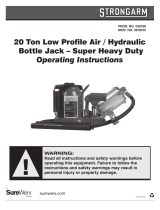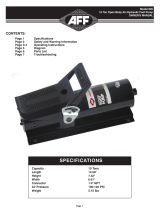
Contents DynaPCN 10-20-00 User manual Rev. 4-1
6.2.1 Example 1: What happens when the doors are closed? 35
6.2.2 Example 2: What happens when the doors are opened? 35
7 How to install the DynaPCN 10-20-00 37
7.1 Evaluate the characteristics of the installation 38
7.1.1 Pay attention to the installing place 38
7.1.2 Pay attention to the installation height, to the distribution of local population’s height, and to the Detec-
tion Area 39
7.1.3 Pay attention to the width of the gate to detect. How many PCN devices do you need? 40
7.2 Connect the rear interfaces, the power supply source, and adjust the angle of the front panel 41
7.2.1 How to mount the Case Extension 44
7.3 Connect the Digital I/Os 45
7.3.1 Digital Inputs (GPI1 and GPI2) 45
7.3.1.1 Electrical schematics 45
7.3.1.2 Recommended operating conditions: 45
7.3.1.3 Example: how to simulate a Digital Input 46
7.3.2 Digital Outputs (GPO1 and GPO2) 47
7.3.2.1 Electrical schematics 47
7.3.2.2 Recommended operating conditions: 48
7.4 Mount the DynaPCN 10-20-00 above the gate 49
7.5 Turn ON the DynaPCN 10-20-00 50
7.5.1 How to turn OFF the DynaPCN 10-20-00 50
7.6 Connect the DynaPCN 10-20-00 to the Host PC 51
7.7 Install the USB/Ethernet RNDIS Gadget in the Host PC 52
7.7.1 How to install the USB Ethernet/RNDIS Gadget if the Host PC runs Windows XP 53
7.7.2 How to install the USB/Ethernet RNDIS Gadget if the Host PC runs Windows 7 58
7.7.3 How to install the USB/Ethernet RNDIS Gadget if the Host PC runs Windows 10 63
7.8 Configure the network between DynaPCN 10-20-00 and Host PC 67
7.9 Connect the DynaPCN 10-20-00 with WinClient 70
7.10 Verify the connection and the counting with WinClient 72
7.10.1 What to do if you have connection issues 74
7.10.2 What to do if you have counting issues 74
7.10.3 How to reset the counters 75
8 How to set the WinClient parameters 77
8.1 How to set date and time 77
8.2 How to set the installation height 78
8.2.1 How to manage installations at heights below 225 cm 78
8.3 How to set the light intensity of the LEDs 79
8.4 How to set the in / out directions 79
8.5 How to set the door width 80
8.6 How to set the position of the Door Threshold 80
8.7 How to disable the Background subtraction 81
8.8 How to set the masking (No Tracking Zone) 82
8.9 How to configure and test the Digital I/Os 83
8.9.1 How to configure the Digital Inputs (GPI1 and GPI2) 83
8.9.2 How to test the Digital Inputs (GPI1 and GPI2) 84
8.9.3 How to test the Digital Outputs (GPO1 and GPO2) 84
8.10 How to enable the Move Detection 85
8.11 How to enable the System Diagnostic 86
8.12 How to reboot the DynaPCN 10-20-00 87
8.13 How to restore the factory settings 88
9 What is a log-file. How to save a log-file 89
9.1 Log-file example (1/2) 90
9.2 Log-file example (2/2) 91
9.3 How to save a log-file 92
4 / 108
























